News
Türkiye's Top 500 Industrial Enterprises Were Discussed in The ICI Assembly Session of May
- 26.05.2021
- News
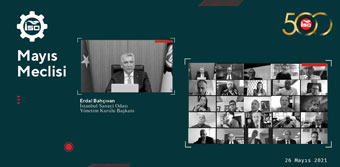
The Assembly of Istanbul Chamber of Industry (ICI) convened on May 26, 2021 via video conferencing. The assembly was opened by Mr. Serdar Urfalılar, Vice President of the ICI Assembly and then presided by the President Zeynep Bodur Okyay. The main agenda item of the assembly was "The evaluation of the Results of ICI Top 500 Enterprises Survey in terms of our Industry and Economy during the Pandemic”. A panel was organized during the assembly meeting with the participation of Economist Dr. Can Fuat Gürlesel and Ferda Besli, the CEO of Besfin Financial Consultancy, and Dr. Şeref Oğuz, president of the editorial board of Dünya Newspaper acting as the moderator.
President of ICI assembly Zeynep Bodur Okyay made the following evaluation concerning the agenda of the May assembly:
"We achieved a growth of 1.8% in 2020 under the conditions of pandemic. We rank the 2nd after China in terms of economic growth among the G20 countries. Our industrialists are tackling problems like the depreciation of Turkish lira, inflation, interests, and the burden of financing. The tendency of the credits to turn towards non-industrial sectors constitutes a problem for us. High raw material and commodity prices hamper our ability to achieve the performance we want. The number of companies engaged in R&D activities has been gradually increasing since 2013. We have not heard a clear explanation yet about how an increase of economic growth and employment would be achieved. We are afraid of being late in taking action for recovery. The European Green Deal is an issue that we have to follow up because it is a process that would lead to a structurally radical transformation just as the industrial revolution did. The post-pandemic world shall enter into a different period in terms not only of the prices but also legal systems and preferences of cooperation. As far as digitalisation is concerned, we may say that the consumers have exhibited a high level of integration to the digital world but this is not the case for our industrialists. It is of course not easy to make a prioritization in this regard, but it is also impossible to oversee its importance”.
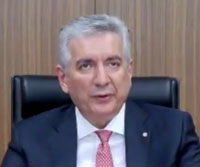
In his speech about the agenda of the assembly, Mr. Erdal Bahçıvan, Chairman of the Board of Directors of ICI started his statement by saying that the pandemic had also an negative impact on the schedule of the announcement of Top 500 Enterprises last year. “We put back our calendar for the announcement of Top 500 Enterprises first to June and then to May in the recent years with great efforts, but had to postpone it to July due to the pandemic last year” he said. “We managed to move the earlier again thanks to the hard-work and self-sacrificing contributions of our consultants, particularly the Economic Research and Corporate Finance Branch”.
Mr. Bahçıvan shared his pride for the announcement of ICI Top 500 on May 26th which is the earliest date so far regarding that survey and thanked everybody who contributed to sharing this valuable treasure with the public so early in an age where early access to information has a great importance. "Since the 50th anniversary of ICI Top 500 Enterprises we share one of our previous issues with the public in order to remember the past. On this occasion, I commemorate Mr. Ertuğrul Soysal who was the chairman of our chamber during that period and I would like to thank everybody who had a share in these activities" said Bahçıvan.
Pointing out the negative impacts of the pandemic experienced in 2020 on all the economies in the world, Bahçıvan said: “The global economy shrank by 3.3% in 2020 which is the most drastic shrink in the last ten-year period and that all regions and countries in the world felt that impact. The American economy, the biggest economy of the World, ly shrank by 3.5% while recession in the Euro zone became 6.6%, a historic record in that region. Despite this economic recession which was felt in all the countries from Japan to India, to Brasilia and to Russia, Türkiye came to the fore as one of the few countries that has achieved a positive growth with 1.8%.”
At this point, Mr. Bahçıvan pointed out the place and the importance of our industry for the economic growth of Türkiye. “While our country achieved an economic growth of only 1.8%, our industry posted a 2% growth which deserves all kinds of appreciation for its contribution to the economy under these difficult conditions. The Turkish industry has shown a very sensitive and responsible attitude and continued production during this period of pandemic just as it did during the previous challenging periods during which many sectors experienced significant distresses.
“Our industry made the biggest contribution to Türkiye's ability not to incur any shortage in any area from health products to staples even in the most difficult days of the pandemic. It is the backbone of the Turkish economy in terms of export revenues, employment and tax revenues. We had left behind a year of pride despite all the negative impacts of the pandemic last year.”
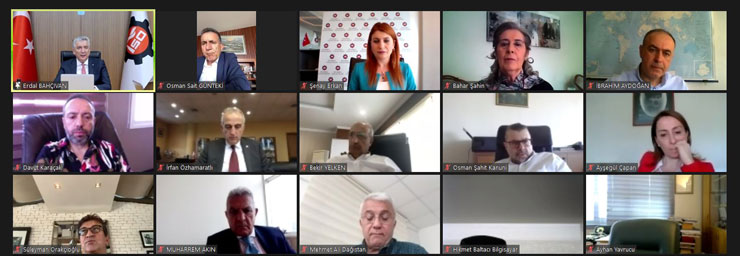
Mr. Bahçıvan also gave information about the sales figures. “The production-based sales of ICI 500 increased from TRY 1.22 trillion to TRY 1.18 trillion, corresponding to an increase of 15.3%, signaling an indication of a slowdown of growth performance compared to the increase of 34.5% and 16.4% in 2018 and 2019, respectively. When the factor of consumer inflation is disregarded, the production-based sales increased only by 0.6% in real terms, which is the lowest figure of the last 4 years.
“It goes without saying that the lockdowns imposed against Covid-19 and the consequent shutdown of the global markets for a definite period of time had an impact on this slowdown occurred in 2020. Although there has been a recovery in the demand in the second half of the year, the domestic sales remained limited due to the financial fluctuations, increasing interest rates and the rising second wave of the pandemic.
“Financing expenses of ICI Top 500 rose to TRY 88,8 billion with an increase of 39.2% in 2020 and operating profit increased by 55% to TRY 142.8 billion, and thanks to this the proportion of the financing expenses to the operating profit declined from 69.3% to 62.2%. Despite this relative improvement, our industrial enterprises continue to allocate a significant portion of the profits they obtained from their core businesses to their financing expenses.
“The total amount of financial debts of ICI 500 increased by 23% in 2020, reaching TRY 406.3 billion to TRY 499.6. As far as the development of the debts by their maturity is concerned, short-term financial debts increased by 22.4% from TRY 168.7 to TRY 206 billion, whereas the long-term financial debt increased by 23.3% from TRY 406.3 to TRY 499.6. Türkiye enjoyed a quite strong expansion of credit volume with around 35% and that the fact that the increase in the financial debts of ICI 500 remained limited to 23% was an indication that the credits were rather directed to non-industrial sectors. The table showing the relation between the current assets and fixed assets within the total amount of assets was one of the most important indicators in recent periods. The share of fixed assets in the total assets in ICI Top 500 rose up to 46.3% in 2015 but then unfortunately began to decline and dropped to 39.1% in 2019.
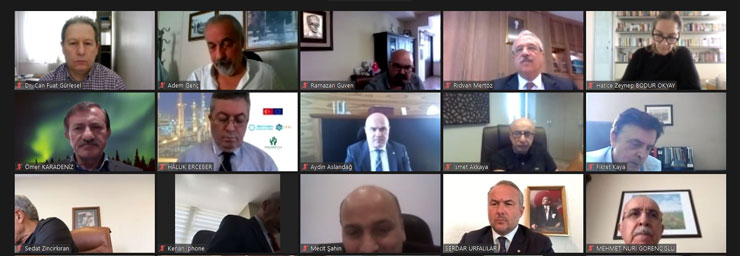
“The share of fixed assets decreased by 2.8 points in 2020 and dropped to 36.3. Extraordinary conditions push the companies towards liquid assets and restrict their investments in fixed assets. Although this table points out to a tendency of decline in the fixed assets, I would like to draw your attention to another factor that caused this situation. As you know the practice of inflation accounting was lastly applied in 2004. After that, revaluation procedures were not applied in the balance sheets of the companies. Considering that high inflation was reintroduced to our lives in the past 3 years, we may clearly see the need of our industry to re-evaluate its fixed assets. And the fact that our industrialists are increasingly and more frequently demanding revaluation is a sign of this situation.
"When we take a look at the added value created according to the intensity of technology, we see that a promising progress was achieved albeit in small steps for the last three years especially in the middle high and high-tech groups. The total added value created by middle-high and high-tech within the added value created by ICI 500 in 2018 was 27.5% compared to 30.4% in 2019 and 31.2% in 2020.”
Mr. Bahçıvan announced the first 10 companies of ICI Top 500 as follows: 1.Tüpraş, 2. Ford, 3. Oyak, 4. Toyota, 5. Name not announced, 6. Star Refinery, 7. Arçelik, 8. Tofaş, 9. Erdemir, 10. İsdemir.
Mr. Bahçıvan: “The results of ICI Top 500 Enterprises 2020 put forward the fact that our economy has a strong trivet as industry. The results obtained yesterday must be evaluated in the light of the actual development and data in order to ensure their sustainability. In this context, Türkiye disassociated itself from the global industrial data negatively, especially for the last several months according to the data obtained from the manufacturing sector purchasing managers’ index (PMI) announced under the scope of İSO-Markit cooperation. The strength taken by the world from the industry last year also necessarily had a positive impact on Türkiye.
"When we take a look at PMI Values of this year, we see that the positive outlook of Türkiye last year did not proceed in the same direction. A look at the announced PMI figures for the last April 2021 shows that the global manufacturing sector purchasing managers index (PMI) measured as 55.8 has reached the highest level of the last 11 years. PMI index of the Eurozone, our largest export market, also broke the record of the past 24 years with 62.9. On the other hand, I think that the negative dissociation of Turkish PMI index from the world with its score of 50.5 in April must also be taken into consideration by all sectors. While the world industry experiences its most favorable period since 2009, we must not oversee the fact that we have been the country with the fourth lowest performance in terms of PMI data measured in 34 economies and considered as the most valuable and reliable brand in terms of making a global comparison of manufacturing sector. It is a must for us to explore the fundamental reasons of this situation. We may consider the recurring unfavorable developments in inflation and financial markets as the two most fundamental reasons in this regard. On the other hand, drastic increases in the prices of imported raw material are increasingly creating a higher pressure on our industrialist. These increases will be a very serious source of distress in the upcoming days as they give rise to a need for additional working capital and consequently for financing".
Mr. Bahçıvan also pointed out that inflation has been another important source of distress for the industrialists this year, emphasizing that as industrialists they do not want to live in an environment of high inflation. “Inflation means unpredictability and instability both for the societies and economies. We must absolutely win the fight against inflation which means unpredictability and instability for everyone. No investment is possible in an inflationist environment. The appetite for investment could not be put into action despite the high rate of increase in the number of investment incentive certificates issued last year" he noted.
Mr. Bahçıvan continued his statement as follows: " As a requirement of its understanding of responsibility for our country, Turkish industrialist have successfully taken its place on the foreground in the fight of our country against the pandemic already in the beginning from the first days following the outbreak of the pandemic using all the means available in the most optimum and energetic manner as possible. Of course, we wish that this achievement leads to a development with a competitive edge in all the markets in the world by means of new investments fostered by strong supports so that our industry may make a contribution to a growth of higher quality and to increasing the volume of exports, which is desperately needed by our country, at a higher level. We wish that our country reaches an industrial infrastructure and strength with a predominantly high-tech structure able to create more added value. I hope and believe that if such opportunities are created, the ICI 500 data of the upcoming years will yield a more positive, stronger and sustainable outlook in comparison to the present day.”
After this speech, a panel took place with the participation of the economist Dr. Can Fuat Gürlesel and Ferda Besli, CEO of Besfin Financial Consultancy, with Dr. Şeref Oğuz, chairman of the editorial board of Dünya Newspaper acting as a the moderator. Results obtained from ICI 500 2020 survey were evaluated in the panel.

Şeref Oğuz stated that the tradition of ICI 500 is a point of pride, adding that increasing the profitability of the companies is very important. He stated that ICI 500 2020 put forward five important and eye-catching results, namely the increase of total amount of debts, increase of financial expenses, decline of exports, increase of VAT burden and the number of companies engaged in research and development studies is only 271, which is unacceptable. He pointed out that a society without industry would be deprived of many of its potential capabilities and added that the increase in inflation figures evoked scenarios even worse than the situation in the 1990s.

Economist Dr. Can Fuat Gürlesel briefly made the following statement during the panel: “Our industrial companies increasingly focus on their own activities and carry out the business that they know. We see the contribution of research and development and innovations. ICI 500 companies increased their operating profits and managed to deal with the challenging conditions in 2020. I see 2020 as a year of revival for the industry worldwide. All the countries embraced their industry with enthusiasm as against service and financial sectors which had prevailed up to that time. We almost returned to the first industrial revolution. The countries began to say "the safety of supply is important. For that reason, let us produce and protect our industry. Let us get back the industry which we had left to Asian Pacific. This is a lasting trend. Turkish industry is at a very important position. At this point, we have to analyze the opportunities and risks well and adapt to the conditions properly. Supply from immediate sources and regionalization will be the increasing trends. Countries will increase the cooperation among them both in technological and commercial terms. We are entering into a period during which we need to improve and enhance our relations with the EU. We've got to have a driving force behind us. Furthermore, will we be able to maintain the state of inflation and interests in 2021? The most saddening fact in this context is that our country is entering into a spiral of high inflation, exchange rates and interest rates of the pre-2012 period with a low density. Do not expect anything from the industrialists if you cannot reduce inflation".
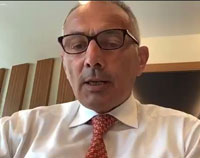
Ferda Besli, CEO of Besfin Financial consultancy: "Our industrialists passed through the crisis period in the year 2002 quite successfully by means of a sound liquidity management. It seems that our industrialists demonstrated a better debt management compared to the past. The rate of foreign-currency credits declined from 75% to 67%. We speak of manufacturing technological products with added value as far as technology is concerned; however, this is easier said than done. On the other hand, it is an imperative for us. Our profit margin increased by 2%. We see improvements in our financial ratios, the number of foreign companies dropped from 117 to 110 this year. We have to launch a campaign in order to attract and encourage the foreign investors again.
“We had built up a good trend in the automotive sector 20 years ago; this is the base of our strength in that sector. We have to increase our strategic cooperation even further. We have to compensate our failure to create technology by manufacturing technological products based on strategic operations and increase our profit margin to 25% in this way. Our industrialists must focus on this point as far as public offering is concerned.
“Investments in research and development activities will increase along with the strengthening of our capital structure through public offerings. Obtaining finance from external sources will be even harder, resulting in high cost of borrowing. Consequently, we have to strengthen the capital structure of our companies".
After the panel, the members of the ICI assembly shared their views on the agenda and their questions were answered by the panelists.